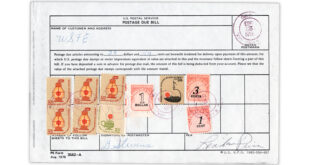Royal Mail has announced plans to end six-day-a-week mail deliveries. This is part of a worldwide offensive by post and logistic companies to slash thousands of jobs, spearheading a cost-cutting and profit-driven restructuring.
The stampede by Royal Mail to ditch the Universal Service Obligation—a legal requirement meant to safeguard mail deliveries to 32 million UK households—is to realise a long-held agenda since privatisation being aggressively pursued by parent company International Distribution Services (IDS).
Dressed up as “modernisation” and the inevitable outcome of declining letter volumes, Royal Mail is creating a parcel-led business based on gig-economy pay and conditions to compete with Amazon, UPS and other corporate players.
As one of the most globalised sections of the working class, postal and logistics workers have tremendous power. But this can only be realised by breaking the grip of the pro-company trade unions whose well-paid officials work hand-in-glove with management and the government to enforce the dictates of the market.
Across Europe, North America and Australia the same slash and burn agenda is being implemented with the collusion of the unions: the use of automation to axe jobs and hike up workloads, the slashing of pay rates and gutting of terms and conditions overseen by a brutal regime of performance management.
But postal workers are fighting back. Over the past year, rank-and-file committees have been built in Britain, Canada, the US and Australia, affiliated to the International Workers Alliance of Rank-and-File Committees (IWA-RFC).
The World Socialist Web Site has provided coverage of these crucial battles:
US Postal Service
The Biden administration is overseeing a restructure of the US Postal Service (USPS) through a 10-year plan “Delivering for America” to eliminate 50,000 jobs and pave the way for privatisation. It will mean the closure of 1,000 local post offices and the merger of sorting, processing and delivery centres into massive hubs modelled on UPS and Amazon.
USPS workers have written to WSWS in their hundreds. One worker explained: “Every single day is depressing, as management treats us like cattle. This is not a place to make a career like it used to be. And let me not forget: the union does not take care of us! Complaints are ignored and union reps nearly always side with management! Everything the union does is kept in secrecy.” (See more comments from USPS workers here)
Like Royal Mail, the US Postal Service goes back centuries. The founding statement of the USPS Rank-and-File Committee explained how the USPS was founded before the American Revolution, under first Postmaster General Benjamin Franklin. “Postal workers used to be proud to serve their customers and communities, delivering mail and packages where no private logistics company would go.”
Today, the company is being torn apart by corporate interests. The 10-year plan against the workforce is a joint enterprise by Democrats and Republicans and this means that postal workers face “a political fight over the allocation of society’s resources.”
Canada Post
At Canada Post the Liberal government led by Justin Trudeau is demanding the overturn of work practices and job security via Artificial Intelligence (AI) and the introduction of “dynamic routing”. It aims to eliminate route ownership for postal workers, setting routes on a daily basis, which Swiss Post has boasted led to cost reductions of 18 percent during weekend deliveries.
Wage cuts, increased workloads and multi-tier wage scales are being enforced through management bullying. A Canada Post worker explained to WSWS: “Every single motion that we do is timed. The smallest thing, like a walk, is timed. From tying your shoes to washing your hands, we’re timed for all this stuff. The corporation has now put forward that they want to get rid of wash up time… it’s 5 minutes a day but it would work out to about 500 routes across the country that would be gone. I know the [union] national is going to give that up.” (Read more Canada Post comments here)
Around 50,000 postal workers are currently working without a contract. The Canada Union of Postal Workers (CUPW) is offering no opposition to the company’s plans. A motion adopted by the recently formed Postal Workers Rank and File Committee in Canada explained: “By building the Postal Workers Rank-and-File Committee, we can wrest control of our contract struggle from the CUPW and articulate demands to unite and defend the jobs and conditions of all workers at Canada Post.” (Read resolution and summary of meeting here)
UPS: North America
The use of automation to slash jobs is being spearheaded in North America by UPS. Its “Network for the Future” plan will lead to the shutdown of at least 200 facilities, threatening tens of thousands of jobs. Company executives will net an estimated $3 billion in savings by the end of 2028 through “consolidating” facilities and automating the remaining hubs. The UPS Workers Rank-and-File Committee, formed last year against a sell-out contract imposed by the Teamsters union, is winning a hearing across North America.
The committee’s recent online meeting was attended by 100 workers from the US and Canada. Replying to a Teamsters official who claimed that UPS has the “right” to make job losses, the committee stated: “Against the bogus “right” of UPS to do whatever they want, which the Teamsters overseers uphold as holy writ, we must impose our will to protect jobs and our livelihoods.”
Australia Post
The Australian Labour government has repealed legislation requiring daily letter delivery by national carrier Australia Post (AP). The “new delivery model” forms part of a “Post26” plan to cut labour costs by 17 percent between 2023 and 2026, with letter frequency to be cut by half, and rounds increased by up to 50 percent, eliminating most walking beats.
Australia’s Communication Workers Union (CWU) has accepted this austerity framework in negotiations over a new workplace enterprise agreement. In opposition, the Postal Workers Rank and File Committee explains: “The corporatisation of vital amenities, at the expense of workers’ jobs, wages and conditions as well as the needs of the broader population, serves no purpose other than to slash government expenditure and pave the way for privatisation.”
Royal Mail’s European case studies
Royal Mail-IDS is developing its plans to destroy the USO on the basis of globally coordinated warfare against workers. The company’s RMTV channel has published a series of articles, “Universal Service from around the world”. Its “case studies” include the planned reduction of mail delivery standards to within three days of posting in Germany and the Netherlands, with the latter scrapping a six-day service back in 2014.
It writes of Denmark, which has largely phased out mail: “Since 2012, all citizens and businesses in Denmark have been obliged to receive and read communications from public bodies using a digital post system.”. The universal postal service was ended in January this year, with the exception of mail for the blind, small islands and international mail and with several operators competing in a market for a set price for letters and parcels nationwide.
Members of the Postal Workers Rank-and-File Committee in Britain are working alongside their brothers and sisters at the US Postal Service, UPS and Australia Post. The IWA-RFC is fighting to unite workers against economic nationalism and the endless race-to-the-bottom. This strategy is essential in the mobilisation of the rank-and-file against the CWU bureaucracy led by Dave Ward, which engineered the monumental sellout of the year long fight at Royal Mail last July. The surrender document to slash jobs, gut terms and conditions and implement a two-tier workforce was cited in the CWU submission to the regulator to show its commitment to cost cutting, shelving the USO and dedication to a 24/7 parcel network.
We urge postal and logistics workers to attend the next online meeting of the PWRFC on April 28 at 7pm “Oppose Royal Mail’s Assault on the USO! Defeat CWU’s Collusion”. Register here:
Sign up for more information about how to join or build a rank-and-file committee in your workplace
Source link



